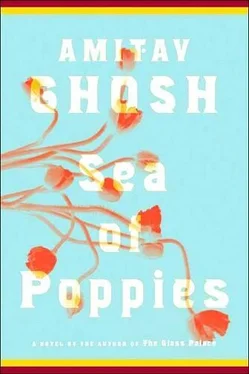dai/dye (*The Barney-Book): See dadu.
+dak/dawk: Neel believed that this word would eventually yield to the English 'post' even in India, but he was convinced also that it would find its way into the Oracle, not on its own steam, but because of its innumerable compounds – dawk-bungalow, dawkdubba('post-box') etc.
+dam/daam (*The Glossary): 'Sad indeed that India's currency took its name from rupya (Skt. "silver") rather than the more accurate Hind. dam , "price". I well remember a time when an adhelahwas half, a paulaha quarter and a damrian eighth of a dam. A tragedy indeed that the word, like the coin, was driven to beggary by a counterfeit – in this instance, by the misinterpreting of the Duke of Wellington's comment of dismissal ("I don't give a dam"). What the Duke had meant to say, of course, was something in the order of "I don't care a tu'penny" ( dam), but instead he bears the guilt of having put into circulation the damnable "damn". At this remove we can only speculate on how different the fate of the word would have been had he said, instead, "I don't give a damri."' On the margins of this note an anonymous descendant has scribbled: 'At least Uncle Jeetu wouldn't have ruined the last scene of Gone With the Wind by shouting at Rhett Butler: "A damis what you don't give, you idiot – not a 'damn'…"'
+daroga: See chokey.
dashy (*The Barney-Book): See bayadère. 'This word is said to be derived from devadasi (temple dancer), hence the frequent pairing debbiesand dashies.'
+dastoor/dastur: Because Neel always gave precedence to nautical usages he assumed that this word would come into the Oraclebecause of the Laskari usage, in which it was the equivalent of 'stu'nsail/studdingsail' (see also dol). He allowed, as a long shot, that its homo-nym, which designated a Parsi religious functionary, might also stand a good chance of inclusion. He was wrong on both counts: the Oracleunaccountably has chosen to gloss it as 'custom' or 'commission', from which usage it derives dastoori, destooryetc. These last Neel ruled out, because their meaning was so close to bucksheesh.
+dawk: See chit.
+dekko, dikk, deck, dekho: Neel took bitter exception to all attempts to attribute this word to English Gypsy slang, insisting that it was a direct and recent borrowing of the Hind. dekho , 'to see'.
+devi, debi, debbie: 'In English usage, the Hind. word for "goddess" acquired a wholly different connotation (for which see bayadère). The Laskari devi, on the other hand, was a corruption of the English "davit".'
+dhobi: 'The mysteryof laundering.'
digh (*Roebuck): Neel was firmly of the opinion that this Laskari equivalent of the nautical sense of the word 'point', as in 'points of sailing' or 'headings in relation to the wind', came from the Bengali word for 'direction'.
+dinghy: From time to time, Neel would inscribe a question mark against words which had been rewarded, in his view, beyond their just desserts. Neel's interrogation of dinghywas scored with an especially heavy hand, for of all the Bengali words for river-craft this one seemed to him the least likely to be raised to coolinhood, the dingi being the meanest of boats.
doasta: 'This is one spiritous liquor about which the good AdmiralSmyth is right; he describes it as: "An inferior spirit often drugged or doctored for unwary sailors in the pestiferous dens of filthy Calcutta and other sea-ports in India".'
dol (*Roebuck): Several of Neel's Jack-Chitsare devoted to the lascars' words for the architecture of a sailing vessel. ' Dolis what they call a mast, and for sail they use a borrowing from the English serh(though I have sometimes heard them employ the good Bengali word pâl ). To these are attached many other terms, of greater specificity: thus trikat(often mispronounced "tirkat") is "fore-" when attached to either dolor serh; barais "main-"; kilmiis "mizzen-", and sabaris t'gallant. A jury mast goes by the apt name phaltu-dol. As for the other sails: a sawaiis a stay-sail; a gaviis a topsail; a tabaris a royal; a gabaris a sky-scraper; a dasturis a stu'nsail; and a spanker is a drawal. By combining these elements they are able to point to the most insignificant scraps of canvas – in their speech, the fore-t'gallant-stu'nsail is the trikatsabar-dastur, and they have no need even to attach the word serhfor their intention to be perfectly understood. The most curious words are reserved, however, for the tangle of tackle that projects agilfrom the vessel's head: the jib, for example, is a jíb, which malumsimagine merely to be a Laskari mispronunciation of the English word, little knowing that it means "tongue" in Hind.; their word for fly ing jib, fulanajíb, might be similarly mistaken by those who did not know that it might also mean "anything's tongue"; but most curious of all is the word for the very tip of this spar, which is called the shaitan-jíb. Could it be because to work there is indeed to feel the terror of sitting upon the Devil's tongue?'
+doll/dal: Neel would have been glad, I think, to learn that the Oracularform for this commonest of Indian foods is dal, rather than either doll(not to be confused with pootly) or the mysterious dhal , which is of course the Hind./Bengali word for 'shield'. In one of his jottings he speculates that it is often thus spelled in English because it refers to a popular battlefield dish, 'lentils cooked in a shield.'
+doolally/doolally-tap: 'An illness once greatly prevalent among sahibs and mems, being the English equivalent of the Malay "amok". It derived its name from Deolali, where there was a well-known asylum. I believe it to have been one of the side-effects of laudanum, which would account for its present desuetude.'
+dosooti/dosootie (*The Glossary): Literally 'two yarn', coarse cotton cloth; 'I was astonished to learn from Mr Reid that in America Dosootie is considered the highest quality of shirt fabric.'
druggerman (*The Glossary): 'Like moonshies, dubashesand linkisters, a mysteryof language – an interpreter whose title derives from the Arabic-Persian tarjuman .'
+dubba/dubber: This word owes its presence in the Chrestomathy to las-cars, who made the Hind. word for 'box' or 'container' a common article of nautical usage.
dubbah/dubber (*The Admiral): Neel took exception to the Admiral's definition of this term: 'a coarse leathern vessel for holding liquids in India.' 'Almost never in Hind. is this common term for container applied to a receptacle that holds liquids. Such a usage is clearly exceptional, even among those who occasionally apply it to certain objects that are necessary for the proper conduct of stool-pijjin.' See also dawk.
Читать дальше












